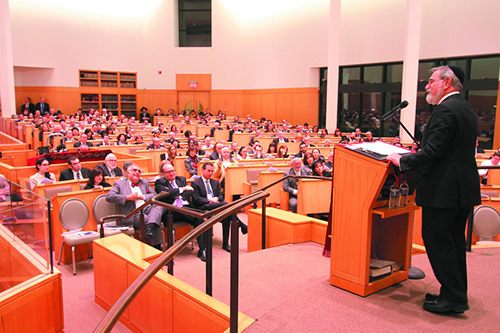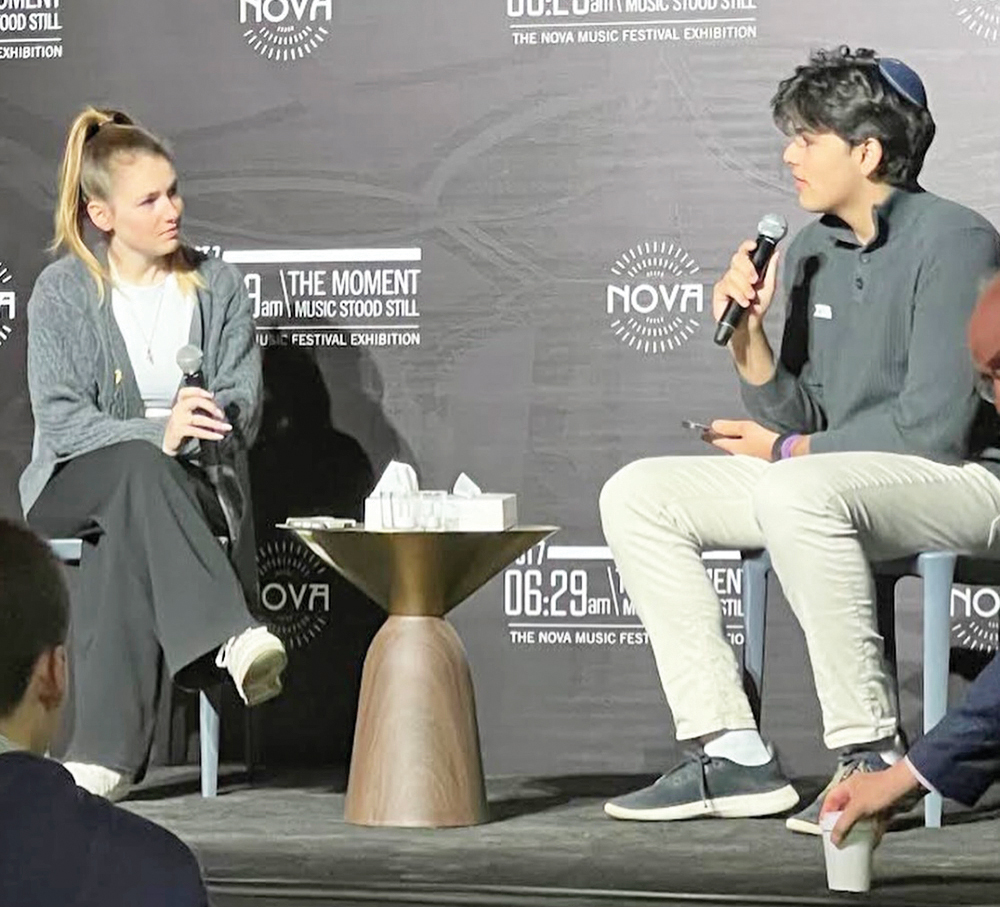
Teaneck—On spending a Shabbos in Teaneck several years ago, said Rabbi Lord Jonathan Sacks, “I’d never been to such a remarkable community—a community of talmedei and talmiddot chachamim, a community of people who so clearly loved everything about yiddishkeit,” he said.
Rabbi Sacks addressed the greater Teaneck community at a special melave malke on March 22, preceding the following day’s Rabbi Isaac Elchanan Theological Seminary (RIETS) Chag HaSmicha. Bergen County, this year, has the distinction of producing the most musmachim from any one place. Out of 225 total musmachim, there are 27 newly-ordained rabbis from Teaneck, seven from Bergenfield, seven from Fair Lawn, five from Englewood, and one from New Milford. Twelve of the current musmachim are graduates of the Frisch School, and 13 are graduates of the Torah Academy of Bergen County, according to Chaim Wietschner, a RIETS trustee and member of the Teaneck community.
YU’s president Richard Joel introduced the world renowned former chief rabbi of England, who is currently completing the first of at least three years serving as the Kressel and Ephrat Family University Professor of Jewish Thought at Yeshiva University. “Rabbi Sacks has brought his inimitable manner of expression, his vast knowledge in matters sacred and secular, to our students, who, thank God, have the training from their rabbeim to be able to digest on the deepest level what Rabbi Sacks is saying when he is teaching, so that we can really have a multiplicity of expression and questioning,” he said.
Rabbi Sacks shared several personal stories about his road to becoming a rabbi, including a conversation he had with his father as a 5-year-old child. Sacks said he asked all sorts of questions about Judaism as the two walked home from shul, and his father told him that, for the most part, he did not know the answers. But, his father said, Sacks would soon have the education to teach him the answers, and education his father didn’t have, and in turn, the son would teach the father. One of the most prideful moments of Rabbi Sacks’ life, he said, was being able to give his father the joy of seeing him become the chief rabbi of England.
The turning point of Rabbi Sacks’ life came in 1978, when he went to see the Lubavitcher Rebbe zt”l. After presenting his career quagmire with three career options that did not include the rabbinate (he thought he might become an economist, an academic or lawyer), the Rebbe told him that none of the options he presented were meant for him. “Your job is to train rabbis,” the Rebbe said. “And, you have to become a rabbi yourself so that your students can see how you do it.”
“I understood at that moment that training rabbis is the most important thing you can do in the Jewish world. I never doubted it then and I have never doubted it since. Those institutions that train the future leaders of the Jewish people are the most important institutions of the Jewish people,” Sacks said.
Sacks spent the next eight years teaching at the rabbinical seminary, Jews College in England. But in the 160-year history of Jews College, Sacks said they have not ordained as many rabbis as Yeshiva University was going to at the next day’s Chag HaSmicha, he said.
The role of the rabbi in the community, Rabbi Sacks said, is as important as it is complex, and it involves that each rabbi wear, at different times, the three crowns of Israel, all of which have their birthday on the first of the month of Nissan, which is approaching. The three crowns of Israel are the keter Torah (the crown of Torah), the keter kevunah (the crown of priesthood), and the keter malchut (the crown of sovereighty).
Rabbi Lord Sacks pointed out that in the absence of a monarch, a kohen gadol (high priest), and of a prophet, all halachically legitimate leadership in the Jewish people rests with the rabbis. In this sense, every rabbi wears all the crowns of the Jewish people.
“It is the most extraordinary leadership role the Jewish people ever produced. We are bound to show leadership in three different ways,” said Sacks. “They are our nearest equivalent of kings, malchut. They need a lev shomeya, a listening heart, to have the wisdom of a king, to be able to guide the community in the right direction,” he said.
To wear the crown of Torah, rabbis need to be above all, teachers. The highest accolade we gave to our forefather Moshe? We called him Moshe Rabbeinu, Moshe our teacher. “For us the highest honor in the world is to be a teacher,” Sacks said.
Finally, rabbis of today must have vision. “The entire group of young musmachim, who I’ve come to know just a few of, they are blessed with such vision, and it is a great tribute to this institution,” Sacks said.
As he congratulated the new musmachim, he gave them a taste of what they can expect out there in the world of rabbinic leadership. “It’s not the easiest thing in the world to lead Jews. A Rav is a shepherd of his congregation, but no Jew is ever a sheep. So when you are opting for the rabbinate, you are not opting for a quiet life,” Sacks said.
By Elizabeth Kratz













